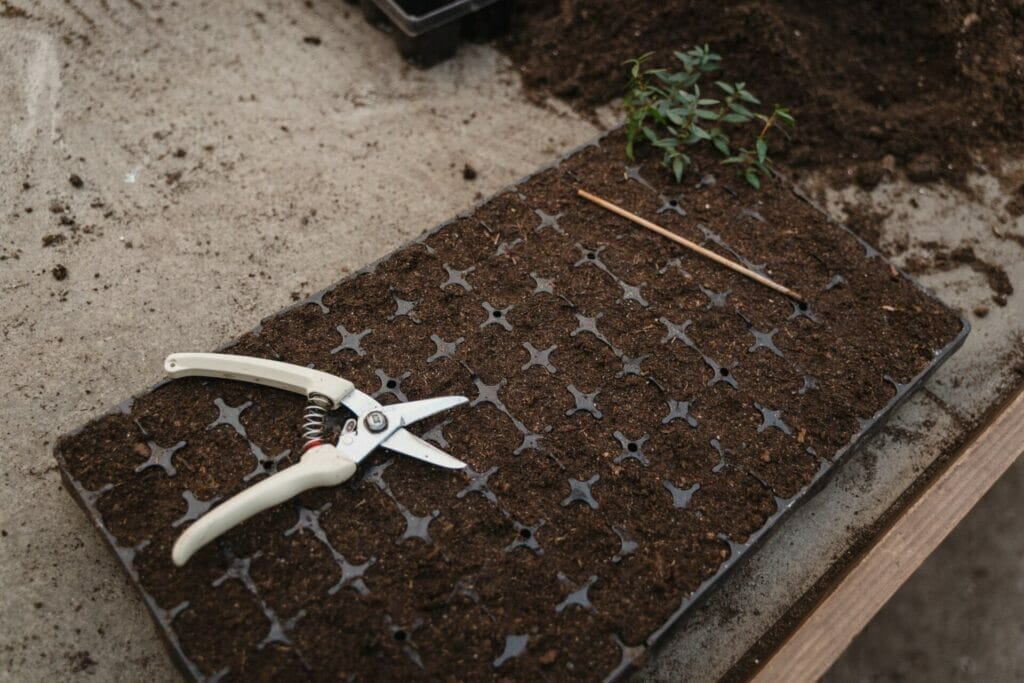Are Coffee Grounds Good For Palm Trees?
Coffee grounds are a great choice for palm trees, as they add needed nitrogen and acidity. Though there is some concern about the caffeine content of coffee grounds, it’s still a beneficial fertilizer for palm trees. The small amount of caffeine remaining in the soil won’t be enough to hurt beneficial insects or soil bacteria, making its use safe for the environment.
So if you have some used coffee grounds lying around, give your palm tree a treat and add them to the soil! Coffee grounds will provide important nutrients that palms need to stay healthy, while still protecting the environment.
How Can Coffee Grounds Benefit Palm Trees?
Coffee grounds can be beneficial to palms, as they contain essential nutrients like magnesium, nitrogen, copper, and phosphorus. These also help to maintain the pH level of the soil (5.5-7.5) as it increases its acidity.

Coffee grounds contain the three main nutrients that most other plants need: nitrogen, phosphorus, and potassium (NPK). Additionally, it provides calcium, magnesium, copper, iron, boron, and zinc as secondary nutrients for your palm tree’s health.
Coffee grounds, which have a pH level of 5.5-6.8, are ideal for palms due to the slightly acidic soil between 5.5-7.5 pH levels. To ensure the soil’s pH levels are where they should be use either strips or a pH meter when adding coffee grounds to the mix in order to regularly check on its acidity levels.
Will Coffee Grounds Cause Damage To Palm Trees?
The debate continues on whether or not coffee grounds are good for palm trees. On the one hand, some say that coffee grounds contain too much acidity and caffeine which can potentially be harmful to the soil. On the other hand, brewing reduces the amount of acidity and caffeine left in brewed coffee grounds.
That being said, it is true that caffeine from coffee grounds has natural insecticidal properties and can kill beneficial life in the soil if used too often or in large amounts. For this reason, caution should be taken when using coffee grounds for palm trees as opposed to composting them first.
How Do You Use Coffee Grounds To Fertilize Palm Trees?
It’s easy to use coffee grounds as a fertilizer for your palm trees if you know how! If you just have a few handfuls of coffee grounds, you can apply them directly on the soil around your palm tree.
- For larger amounts, like from an everyday pot of coffee, you should compost the grounds first so that the caffeine is decreased before using it on your plants.
- When looking to apply them directly, spread out the grounds, and don’t get too close to the trunk of your palms when applying.
- For daily use, mix your coffee grounds with one part mulch and two-parts water and apply this mixture to the top of the soil.
- Finally, if you have more than what’s suggested above, consider composting it over 2-3 months before applying it around your palm trees.
How Much Coffee Grounds Do Palm Trees Need?
When it comes to using coffee grounds for your palm trees, moderation is key. Generally, you should not use more than 15-20% of used coffee grounds in relation to the total soil or compost content. To ensure that they are fully decomposed when they are applied around the tree, allow 2-3 months for the composting process.
After you’ve finished, spread a layer of compost (1-2 inches thick) around the base of your palm tree, making sure to leave at least 3 inches between the trunk and the compost.
When Is It Appropriate To Apply Coffee Grounds To Palm Trees?
When it comes to applying coffee grounds to palm trees, timing is everything. To get the best results, apply coffee grounds in the early spring and throughout the rest of the growing season while avoiding applying them during winter.
This is because palms typically go more dormant in winter and don’t need that many nutrients. In such cases, add the coffee grounds to compost piles instead.
How Can Coffee Grounds Be Used In Gardening?
Coffee grounds can be an incredibly useful resource in the garden. Gardeners are starting to understand that these free coffee grounds can be used to fertilize plants, improve soil quality, and even deter pesky pests.

Enhances Soil Drainage
Adding used coffee grounds to your garden can help improve the drainage of your soil and make it easier for plants to take in water. Coffee grounds are a free organic material that can increase the amount of organic matter present in your soil.

In this way, it helps improve drainage so that water won’t stay around the roots of plants and cause rotting. With better drainage, your plants will be healthier and able to absorb more nutrients from the soil.
It Aids In Soil Aeration
The amazing thing about using coffee grounds in gardening is that it aids in soil aeration. This means that adding instant coffee grounds to the soil will help it to become more breathable, allowing your plant’s roots to absorb moisture and nutrients better. In this way, you’re promoting a healthier environment for your plants, thereby improving their health overall.
Improves Water Retention In The Soil
Coffee grounds can be used in gardening to improve water retention in the soil. These grounds are a type of organic matter, which when amended to the soil, will increase its water retaining capacity.
This helps plants that like to grow in moist soil since, after rain or watering, the soil will maintain its wetness and reduce the need for frequent watering, saving you money and energy.
Nitrogen Is Added To The Compost
Adding coffee grounds to your compost is an amazing way of introducing nitrogen into the mix. Coffee grounds contain moderate levels of nitrogen, which break down and create a nutrient-rich compost ideal for plant health.
This nitrogen encourages lush leafy growth, so having compost with coffee grounds in it can be beneficial for your plants. Plus, the fact that coffee grounds are brown in color makes it visually appealing to add them to your compost.
Plants Can Be Protected From Slugs And Snails
Gardening can be a dangerous endeavor, as slugs and snails are notorious for damaging foliage and causing the deterioration of plants. Fortunately, used coffee grounds can provide gardeners with effective deterrence against these nasty critters.

It is believed that the smell of the neat coffee grounds, in addition to its grainy texture, is offensive to slugs and snails – thus acting as a physical barrier against them.
It Has The Ability To Repel Cats
Using a handful of coffee grounds in gardening has the added bonus of being able to repel cats from the area. If you find yourself dealing with the frustrating issue of cats spraying or pooping in your garden, this is an excellent way to keep them away.
Cats have a natural aversion to anything that has a strong smell, such as extra coffee grounds, and this will be enough to discourage them from entering your garden.
Encourages A Healthy Worm Population
Adding fresh coffee grounds to your soil or compost can have a huge benefit for your garden by encouraging a healthy worm population! Worms are vital for plant root health and help with the breakdown of compost.
Reduces Waste And Chemical Usage
Using coffee grounds for gardening is a great way to reduce waste, and can also mean decreasing the use of chemicals often used in gardening. Brewing coffee grounds are organic materials that don’t require things like fertilizers or pesticides. They can be blended into the earth with other composting materials without introducing any harmful elements into the soil.
It Has The Ability To Form A Dense Barrier Over Soil
Coffee grounds can be extremely useful in the garden, particularly when used as a mulch or top dressing. The small particles of coffee grounds have the ability to form a dense barrier over the soil, locking in nutrients and moisture.
This means that your plants will have a much better chance of thriving, as they can access moisture and essential nutrients without issue.
Seedlings Are Prevented From Growing
Coffee grounds are a great addition to your garden, but you must be careful when using them around seedlings or young plants. The caffeine in the coffee can inhibit their growth and cause them to wither away quickly.

This will prevent their roots from being affected by the caffeine and potentially lead to an early demise of the plant before it even had a chance.
In Large Quantities, It May Be Harmful To Dogs
Although coffee grounds can be beneficial in gardening, it is important to keep in mind that in large quantities they may be harmful to dogs. If your canine companion likes to explore and taste things, then it would be best to avoid spreading large amounts of coffee grounds around your plants.
Which Plants Do Not Like Used Coffee Grounds?
Adding used coffee grounds to soil can increase the acidity of the earth and alter the pH level, making it unsuitable for plants that need acidic or alkaline soil. Cactus, Pothos, Rosemary, Orchid, and Lavender are all plants that do not respond well to used coffee grounds.
